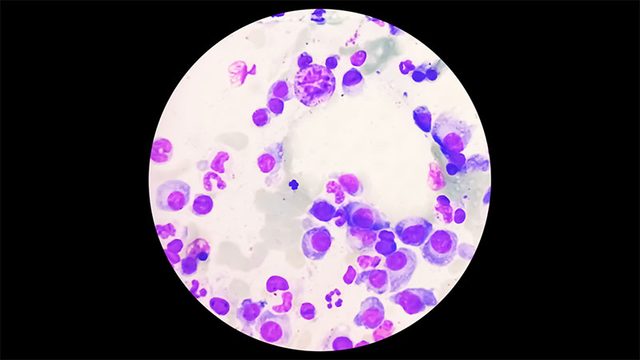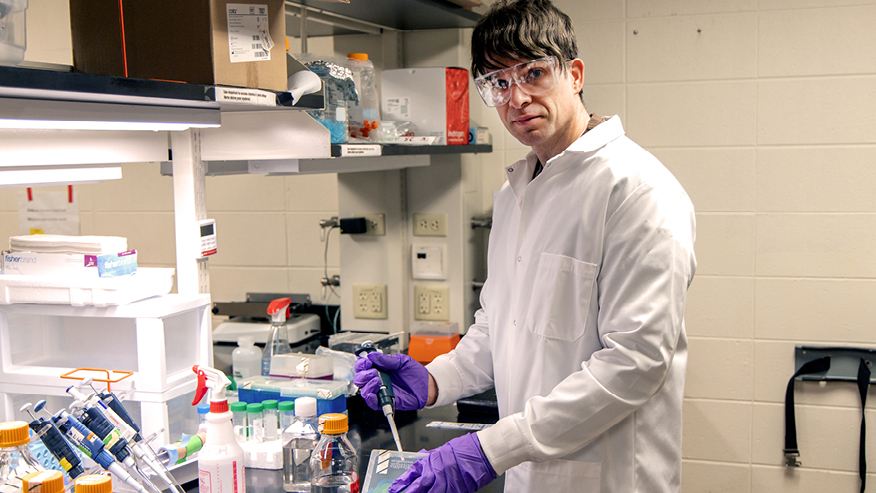MISSION-DRIVEN GIVING
Transforming a diagnosis into a research-driven mission
Through a $4.3 million investment, the Paula and Rodger Riney Foundation is supporting four ambitious research projects at the Purdue Institute for Cancer Research (PICR), each targeting multiple myeloma from a different scientific angle. Their generosity is accelerating the development of new therapies and moving us closer to a future where patients can live longer, healthier lives.
A powerful partnership rooted in shared purpose
Behind every major research breakthrough is a story of connection, vision and trust. The partnership between the Paula and Rodger Riney Foundation and the Purdue Institute for Cancer Research began unexpectedly, but quickly evolved into a dynamic collaboration driven by scientific excellence and a shared urgency to improve the lives of those facing multiple myeloma.
A chance encounter sparks a research partnership
The connection between the Riney Foundation and the PICR began in an unexpected way, through a game-day conversation. In November 2021, Purdue alumnus and Riney Foundation managing director Bobby Sandage Jr. crossed paths with PICR leadership during a football weekend at Ross-Ade Stadium. After learning about PICR’s strengths in drug discovery and cancer research, Sandage encouraged a formal proposal submission. Just four months later, the Foundation committed $4.9 million to support four Purdue-led studies focused entirely on multiple myeloma.
A four-pronged attack on multiple myeloma
The foundation’s support is enabling a multidisciplinary team of PICR investigators to take on the disease through both chemotherapeutic and immunotherapeutic approaches. Investigators including Arun Ghosh and John Tesmer are developing novel small-molecule drug candidates that target critical biological pathways in multiple myeloma. Their work builds on Purdue’s longstanding strengths in chemistry, structural biology and drug design.
Innovating the body’s immune defenses
The other half of the Riney-funded effort is focused on immunotherapy. PICR investigator Sandro Matosevic is developing genetically engineered CAR NK cells—natural killer cells that have been modified to seek and destroy cancer cells with high precision. In a separate but complementary project, Philip Low and Timothy Ratliff are working on a universal CAR T cell platform that, when used in combination with a second agent, can overcome one of the biggest challenges in cancer immunotherapy: antigenic escape. Together, these projects represent bold new directions in engineering the immune system to outsmart cancer.
PICR expertise, Riney vision
The partnership between the Riney Foundation and PICR is rooted in shared values: scientific rigor, translational potential and a deep commitment to patients and families facing cancer. With decades of experience and a proven ability to turn discovery into impact, PICR researchers are proud to join the Riney Foundation in advancing lifesaving solutions for multiple myeloma. The support of Paula and Rodger Riney, through the guidance of Bobby W. Sandage Jr. and the foundation’s expert advisers, has given PICR scientists the resources and confidence to take on one of cancer’s most complex challenges.
A highly personal cancer fight bolsters ‘cutting-edge’ research
Rodger Riney’s personal experience with multiple myeloma inspired a bold philanthropic mission—one that now supports leading-edge cancer research around the world.
At the PICR, that mission is taking shape through four innovative projects aimed at advancing both drug discovery and immunotherapy for this complex disease.

research SPOTLIGHT

Engineering immune cells to fight myeloma
With support from the Paula and Rodger Riney Foundation, Sandro Matosevic is developing a powerful new approach to treating multiple myeloma using genetically engineered immune cells. His research focuses on natural killer cells modified to recognize and attack cancer cells with high precision. Unlike traditional therapies, Matosevic’s approach uses innate immune mechanisms and expands the cells’ ability to target multiple proteins on the surface of cancer cells. The result is a promising new immunotherapy strategy that could overcome treatment resistance and improve outcomes for patients with this aggressive disease.
Join the fight
Join a community committed to changing the future of cancer. Turn promising science into real-world impact by donating today.
Contact Us
Get in touch
Phone: 765-494-9129
Fax: 765-494-9193
Email: cancerresearch@purdue.edu
Meet our team
Find us
201 S. University St.
Hansen Life Sciences Bldg, Rm. 141
West Lafayette, IN 47907